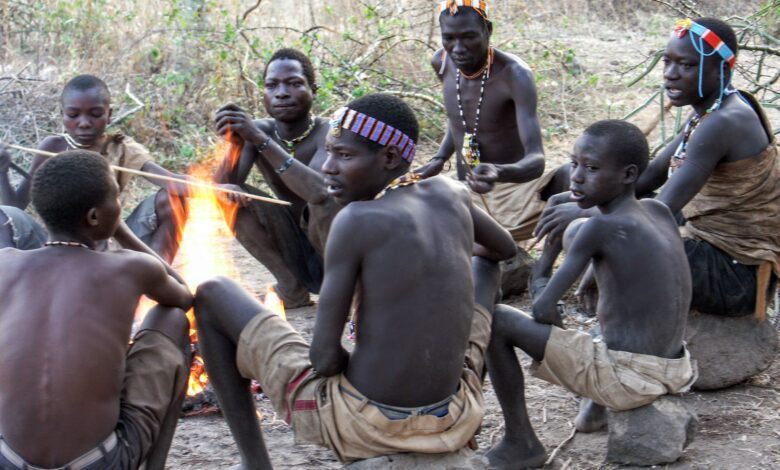Meet the Hadza ethinic group in Tanzania who lives on the forest

A journey to Tanzania offers not only the thrill of wildlife safaris and the relaxation of Zanzibar’s beaches but also a profound opportunity for cultural immersion. Among Tanzania’s many ethnic groups, the Hadza (or Hadzabe) stand out as one of the last remaining true hunter-gatherer communities in Africa, offering a rare glimpse into a way of life that has remained largely unchanged for millennia. Visiting the Hadza community is a deeply impactful experience, but it requires careful consideration and preparation to ensure it’s respectful, ethical, and truly enriching.
Here’s what you need to know before planning a trip to the Hadza community in Tanzania:
1. Who Are the Hadza?
The Hadza are an indigenous ethnic group, numbering around 1,200 to 1,300 individuals, who reside primarily around Lake Eyasi in northern Tanzania, near the Ngorongoro Conservation Area. They are descendants of Tanzania’s aboriginal population and have inhabited their current territory for thousands of years. Unlike most other tribes in the region, the Hadza do not practice agriculture, keep livestock, or live in permanent settlements. Their entire existence revolves around hunting wild animals with bows and arrows and gathering wild fruits, tubers, and honey from the bush.
- Language: The Hadza speak Hadza, a unique click-based language that belongs to the Khoisan language family, distinct from other Bantu languages in Tanzania.
- Lifestyle: They live in small, nomadic bands or “camps” of 20-30 people, moving periodically to follow food and water sources. Their social structure is egalitarian, with no formal leaders or hierarchy.
- Resilience: Despite external pressures from modernization, land encroachment, and past attempts at forced settlement, many Hadza continue to maintain their traditional lifestyle.
2. Why Visit the Hadza?
Visiting the Hadza offers an unparalleled opportunity for authentic cultural immersion and a profound learning experience:
- Living History: It’s a chance to witness a way of life that closely mirrors that of early humans, providing insights into our collective ancestral past.
- Unique Skills: You can observe and even participate in their incredible survival skills:
- Hunting: Joining the men on a morning hunt to see their tracking abilities, use of handmade bows and poison-tipped arrows.
- Foraging: Accompanying women as they gather wild fruits, berries, and roots.
- Fire-making: Witnessing or learning their traditional method of creating fire using sticks.
- Honey Gathering: Learning how they locate and harvest wild honey, often with the help of a “honeyguide” bird.
- Cultural Exchange: It’s an opportunity to interact with them, learn about their customs, songs, and even their unique language (with the help of a translator/guide).
- Appreciation of Nature: Gaining a deeper understanding of their profound connection to the land and their sustainable practices.
3. Ethical Considerations for Your Visit
Visiting indigenous communities carries significant ethical responsibilities. It’s crucial to ensure your presence is beneficial and non-intrusive.
- Choose Responsible Tour Operators: This is the most important factor. Select tour companies that:
- Have a long-standing, respectful relationship with the Hadza communities they visit.
- Ensure a fair portion of your tour fees directly benefits the community as a whole, rather than just a few individuals.
- Prioritize cultural respect over mere spectacle.
- Use local Hadza guides/translators from the community itself.
- Emphasize education and understanding rather than entertainment.
- Avoid “Human Zoo” Experiences: A truly ethical visit is about genuine interaction and learning, not about observing people as if they are exhibits. Avoid operators who promise staged performances or encourage disrespectful behavior.
- No Direct Payments/Gifts: Do not offer money, sweets, or gifts directly to individuals, especially children. This can foster a begging culture and undermine their traditional way of life. If you wish to contribute, do so through your reputable tour operator, who will ensure funds are distributed equitably for community benefit (e.g., healthcare, land protection).
- Photography Protocol: Always ask for permission before taking photos of individuals. Respect their decision if they decline.
- Respect Their Lifestyle: Understand that their primary focus is their daily survival (hunting and gathering), not performing for tourists. Your visit should integrate into their routine as much as possible, not disrupt it.
- Be Mindful of Health: Avoid visiting if you are unwell, to protect the community from outside illnesses to which they may have little immunity.
4. Logistics and What to Expect
- Location: The Hadza live around Lake Eyasi, which is approximately a 3-4 hour drive from Arusha or a 1-hour drive from Karatu (a popular base for Ngorongoro Crater visits).
- Access: You typically access Hadza communities as part of a guided cultural tour. It’s often integrated into Northern Circuit safari itineraries, usually as a day trip or an overnight stay in a mobile camp.
- Early Mornings: Hadza visits usually start very early (around 5:00-6:00 AM) to join the men on their morning hunt, as this is when animals are most active.
- Physical Activity: Be prepared for walking, potentially through uneven terrain, as you accompany the hunters or gatherers. They are highly fit, so you may need to keep up!
- Basic Conditions: Their camps are very basic, with temporary shelters. Do not expect modern amenities. If staying overnight, it’s usually in a comfortable, low-impact mobile tented camp arranged by your tour operator, separate from the Hadza camp but nearby.
- No Staging: A truly authentic experience means no guarantees of a successful hunt or specific activities. You are observing their real daily life.
- Language Barrier: You will need a good, respectful local guide who can translate the Hadza click language and facilitate genuine interaction.
5. Best Time to Visit (2025)
The dry season (June to October) is generally considered ideal for visiting the Hadza, as the weather is more predictable, and walking conditions are better. However, visits are possible year-round. During the wet season, the bush is greener, but some areas might be less accessible, and hunts might be more challenging due to abundant water sources dispersing animals.
A visit to the Hadza community is more than just a tourist activity; it’s an opportunity for profound cross-cultural learning and a chance to contribute to the preservation of an ancient way of life. By approaching it with respect, ethical awareness, and the right preparation, you can ensure an experience that is deeply meaningful for both you and the Hadza people.
Source: Thepressradio.com




